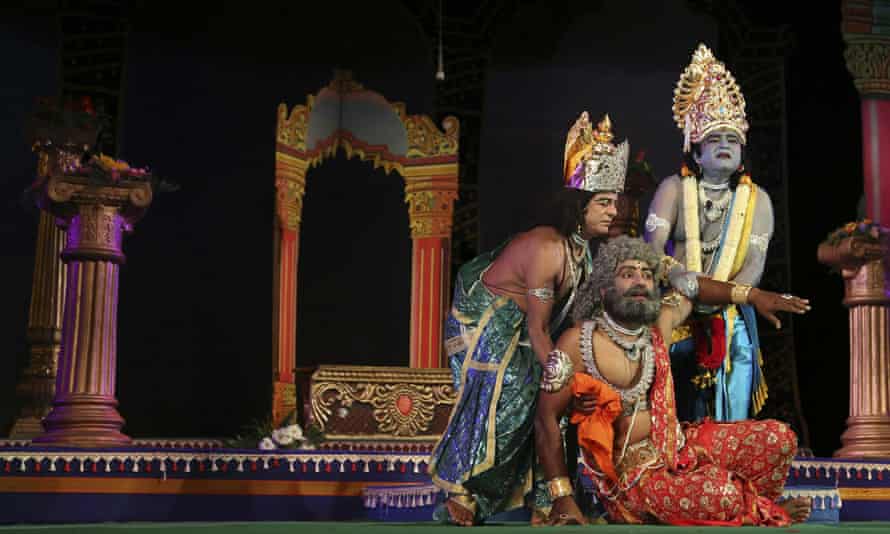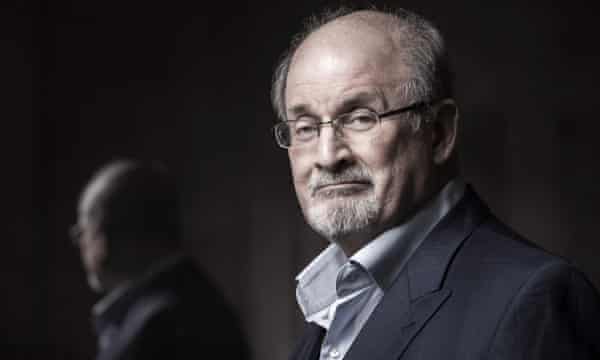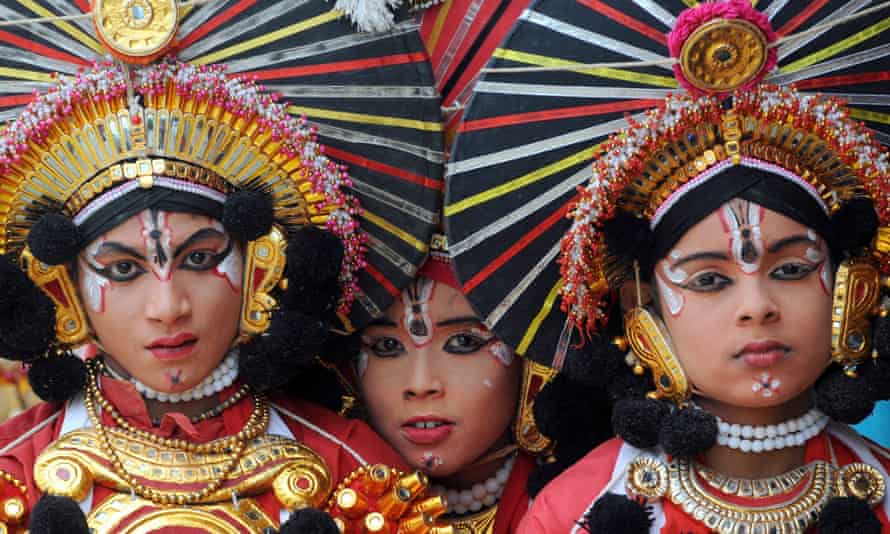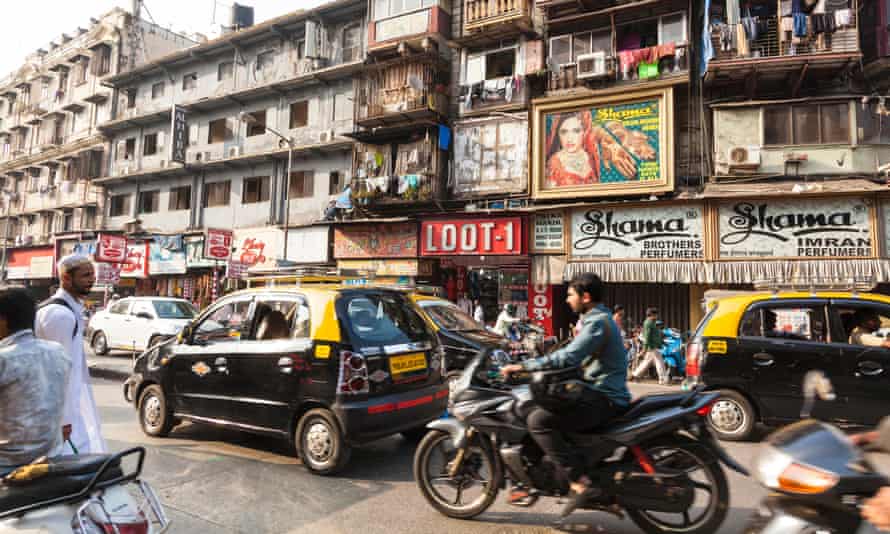Ell Down the Stairs Again in India Today
L ongevity is the real prize for which writers strive, and information technology isn't awarded by whatever jury. For a book to stand the test of fourth dimension, to laissez passer successfully down the generations, is uncommon enough to be worth a pocket-sized celebration. For a author in his mid-70s, the connected health of a volume published in his mid-30s is, quite but, a delight. This is why we exercise what nosotros do: to make works of art that, if we are very lucky, will endure.
As a reader, I have always been attracted to capacious, largehearted fictions, books that endeavor to gather up large armfuls of the globe. When I started to recall about the work that would grow into Midnight's Children, I looked again at the smashing Russian novels of the 19th century, Crime and Penalty, Anna Karenina, Expressionless Souls, books of the type that Henry James had called "loose, baggy monsters", large-scale realist novels – though, in the instance of Dead Souls, on the very border of surrealism. And at the great English novels of the 18th and 19th centuries, Tristram Shandy (wildly innovative and by no means realist), Vanity Off-white (bristling with precipitous knives of satire), Lilliputian Dorrit (in which the Circumlocution Office, a government department whose purpose is to do zero, comes close to magic realism), and Bleak House (in which the interminable court example Jarndyce v Jarndyce comes even closer). And at their great French precursor, Gargantua and Pantagruel, which is completely fabulist.
I besides had in heed the modern counterparts of these masterpieces, The Tin Pulsate and One Hundred Years of Solitude, The Adventures of Augie March and Grab-22, and the rich, expansive worlds of Iris Murdoch and Doris Lessing (both as well prolific to be divers past any unmarried title, but Murdoch's The Black Prince and Lessing's The Making of the Representative from Planet eight have stayed with me). But I was besides thinking nearly another kind of capaciousness, the immense epics of India, the Mahabharata and Ramayana, and the fabulist traditions of the Panchatantra, the Thousand and One Nights and the Kashmiri Sanskrit compendium called Katha-sarit-sagar (Ocean of the Streams of Story). I was thinking of India'southward oral narrative traditions, also, which were a form of storytelling in which digression was almost the basic principle; the storyteller could tell, in a sort of whirling cycle, a fictional tale, a mythological tale, a political story and an autobiographical story; he – because it was always a he – could intersperse his multiple narratives with songs and keep large audiences entranced.

I loved that multiplicity could be so captivating. Young writers are oftentimes given a version of the advice that the King of Hearts gives the White Rabbit in Alice's Adventures in Wonderland, when the Rabbit becomes confused in court almost how to tell his story: "'Brainstorm at the outset,' the King said, very gravely, 'and keep until you come to the end; then stop.'" It was inspiring to acquire, from the oral narrative masters of, in particular, Kerala in south Republic of india, that this was not the only manner, or fifty-fifty the virtually captivating mode, to go about things.
The novel I was planning was a multigenerational family novel, so inevitably I thought of Thomas Isle of man'south Buddenbrooks and, for all its non-realist elements, I knew that my book needed to be a novel deeply rooted in history, so I read, with great adoration, Elsa Morante's History: A Novel. And, because it was to exist a novel of Bombay, it had to be rooted in the movies also, movies of the kind now called "Bollywood", in which calamities such every bit babies exchanged at nativity and given to the wrong mothers were everyday occurrences.
As you can see, I wanted to write a novel of vaulting ambition, a high-wire act with no safety net, an all-or-nothing effort: Bollywood or bust, as ane might say. A novel in which memory and politics, love and hate would mingle on almost every page. I was an inexperienced, unsuccessful, unknown author. To write such a volume I had to learn how to do so; to learn by writing it. V years passed earlier I was ready to show it to anybody. For all its surrealist elements Midnight's Children is a history novel, looking for an respond to the keen question history asks us: what is the human relationship betwixt society and the individual, betwixt the macrocosm and the microcosm? To put information technology another way: do nosotros make history, or does information technology make (or unmake) us? Are we the masters or victims of our times?

My protagonist, Saleem Sinai, makes an unusual exclamation in respond: he believes that everything that happens, happens because of him. That history is his fault. This belief is absurd, of class, and then his insistence on information technology feels comic at start. Later, every bit he grows up, and as the gulf between his belief and the reality of his life grows ever wider – equally he becomes increasingly victim-similar, non a person who acts just one who is acted upon, who does non practice but is done to – it begins to be sad, perchance even tragic. Forty years later on he first arrived on the scene – 45 years after he kickoff made his exclamation on my typewriter – I feel the urge to defend his apparently insane avowal. Perhaps we are all, to apply Saleem's phrase, "handcuffed to history". And if so, then aye, history is our fault. History is the fluid, mutable, metamorphic event of our choices, and so the responsibleness for it, even the moral responsibleness, is ours. Later on all: if it's not ours, then whose is it? In that location'south nobody else here. It's just us. If Saleem Sinai fabricated an mistake, it was that he took on likewise much responsibleness for events. I desire to say to him at present: we all share that burden. You lot don't accept to behave all of it.
The question of language was central to the making of Midnight'due south Children. In a later on novel, The Ground Beneath Her Feet, I used the acronym "Hug-me" to describe the language spoken in Bombay streets, a melange of Hindi, Urdu, Gujarati, Marāthi and English. In addition to those five "official" languages, there's also the urban center'southward unique slang, Bambaiyya, which nobody from anywhere else in India understands. Conspicuously, any novel aiming for readability could not be written in Hug-me or Bambaiyya. A novel must know what language it'southward being written in. However, writing in classical English felt wrong, like a misrepresentation of the rich linguistic environment of the book's setting. In the finish I took my cue from Jewish American writers such as Philip Roth, who sprinkled their English language with untranslated Yiddish words. If they could do it, so could I. The important matter was to make the judge pregnant of the give-and-take clear from the context. If Roth talks nearly getting a zetz in the kishkes, we sympathize from context that a zetz is some sort of violent blow and kishkes are a sensitive part of the human torso. So if Saleem mentions a rutputty motor car, information technology should exist articulate that the motorcar in question is a ramshackle, nearly-derelict erstwhile wreck.
In the terminate I used fewer non-English words than I originally intended. Sentence structure, the menstruation and rhythm of the linguistic communication, ended up beingness more useful, I idea, in my quest to write in an English that wasn't endemic by the English. The flexibility of the English language linguistic communication has immune it to get naturalised in many different countries, and Indian English is its own thing by at present, just every bit Irish gaelic English is, or W Indian English, or Australian English, or the many variations of American English. I set out to write an Indian English novel. Since so, the literature of the English language has expanded to include many more such projects: I'm thinking of Edwidge Danticat's Creole-inflected English in Jiff, Eyes, Retention, for example, or Chimamanda Ngozi Adichie's employ of Igbo words and idioms in Majestic Hibiscus and Half of a Yellowish Sun, or Junot Díaz's slangy, musical, Dominican remake of the language in The Brief Wondrous Life of Oscar Wao.

I found myself in conversation, so to speak, with a great forerunner, EM Forster's A Passage to India. I had admired this novel fifty-fifty earlier I had the nifty good fortune, as an undergraduate at King's College, Cambridge, to meet Morgan Forster himself, who was in residence there as an honorary young man, and was generously and kindly encouraging when I shyly admitted that I wanted to write. Just as I began to write my "India volume" – for a while I didn't even know what information technology was chosen – I understood that Forsterian English, so cool, then precise, would not do for me. It would not do, I thought, for India. India is non absurd. Bharat is hot. It's hot and noisy and odorous and crowded and excessive. How could I represent that on the page? I asked myself. What would a hot, noisy, odorous, crowded, excessive English sound like? How would it read? The novel I wrote was my best endeavor to respond that question.
The question of crowdedness needed a formal answer as well equally a linguistic one. Multitude is the most obvious fact about the subcontinent. Everywhere y'all go, at that place'southward a throng of humanity. How could a novel embrace the idea of such multitude? My respond was to tell a crowd of stories, deliberately to overcrowd the narrative, so that "my" story, the main thrust of the novel, would need to push its way, and then to speak, through a oversupply of other stories. There are small, secondary characters and peripheral incidents in the volume that could exist expanded into longer narratives of their own. This kind of deliberate "wasting" of material was intentional. This was my hubbub, my maelstrom, my oversupply.
When I started writing, the family at the center of the novel was much more than like my family than information technology is now. However, the characters felt oddly lifeless and inert. So I started making them unlike the people on whom they were modelled, and at once they began to come up to life. For example, I did have an aunt who married a Pakistani general, who, in existent life, was one of the founders, and the first principal, of the much feared ISI, the Inter-Services Intelligence bureau. But equally far as I know he was not involved in planning or executing a military coup, with or without the aid of pepper pots. Then that story was fiction. At least I think it was.
Saleem Sinai went to my school. He likewise lived, in Bombay, in my childhood home, in my old neighbourhood, and is just eight weeks younger than me. His childhood friends are composites of children I knew when I was young. Once, after a reading in Bombay, a man came up to me and said: "Hello, Salman. I'm Hairoil." He wasn't wrong. The grapheme of Hairoil Sabarmati, or at least Hairoil's neatly oiled and parted hair, had indeed been based on him. Simply he had never been nicknamed Hairoil in real life. That was something I fabricated upwardly for the novel. I couldn't assistance thinking how strange it was that my childhood friend introduced himself to me by a fictional proper name. Particularly every bit he had lost all his pilus.

But in spite of these echoes, Saleem and I are unalike. For 1 thing, our lives took very different directions. Mine led me away to England and eventually to America. But Saleem never leaves the subcontinent. His life is contained within, and defined by, the borders of Republic of india, Pakistan and Bangladesh. As a final proof that my character and I are not one and the same, I offering another anecdote. When I was in Delhi to do one of the first Indian readings from Midnight's Children, I heard a woman'southward voice cry loudly as I walked out on to the stage: "Oh! But he's got a perfectly ordinary nose!"
Forty years is a long fourth dimension. I take to say that Bharat is no longer the country of this novel. When I wrote Midnight's Children I had in mind an arc of history moving from the hope – the bloodied hope, but even so the hope – of independence to the expose of that promise in the so-called Emergency, followed by the birth of a new hope. India today, to someone of my listen, has entered an fifty-fifty darker phase than the Emergency years. The horrifying escalation of assaults on women, the increasingly authoritarian character of the state, the unjustifiable arrests of people who cartel to stand confronting that authoritarianism, the religious fanaticism, the rewriting of history to fit the narrative of those who want to transform Bharat into a Hindu-nationalist, majoritarian state, and the popularity of the regime in spite of information technology all, or, worse, perhaps because of it all – these things encourage a kind of despair.
When I wrote this book I could associate big-nosed Saleem with the elephant-trunked god Ganesh, the patron deity of literature, amongst other things, and that felt perfectly easy and natural even though Saleem was non a Hindu. All of Bharat belonged to all of the states, or so I securely believed. And withal believe, even though the rise of a brutal sectarianism believes otherwise. But I detect hope in the decision of India's women and college students to resist that sectarianism, to reclaim the former, secular India and dismiss the darkness. I wish them well. Only right now, in India, it'south midnight again.
Source: https://www.theguardian.com/books/2021/apr/03/salman-rushdie-on-midnights-children-at-40-india-is-no-longer-the-country-of-this-novel
0 Response to "Ell Down the Stairs Again in India Today"
Enviar um comentário